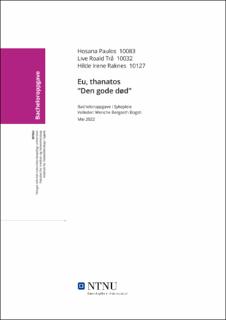| dc.contributor.advisor | Bogsti, Wenche Bergseth | |
| dc.contributor.author | Paulos, Hosana | |
| dc.contributor.author | Trå, Live Roald | |
| dc.contributor.author | Raknes, Hilde Irene | |
| dc.date.accessioned | 2022-07-14T17:19:25Z | |
| dc.date.available | 2022-07-14T17:19:25Z | |
| dc.date.issued | 2022 | |
| dc.identifier | no.ntnu:inspera:106262086:112059431 | |
| dc.identifier.uri | https://hdl.handle.net/11250/3005524 | |
| dc.description.abstract | Bakgrunn: Eutanasi er noe som kommer jevnlig opp i mediene og skaper mye debatt. Eutanasi er noe som ikke er tillatt i Norge og dette kan sees i forhold til lover og sykepleiers yrkesetiske retningslinjer. Holdninger er noe man har med seg gjennom hele livet og det blir påvirket av omgivelsene.
Hensikt: Hvordan sykepleiere møter pasienter med eutanasiforespørsel, og hvilken måte blir holdningene påvirket. Oppgaven vil være med å belyse eutanasi som et samtaletema i Norge.
Metode: Oppgaven er en litteraturstudie, det er gjort søk i ulike databaser for å finne vitenskapelige artikler som bidrar til å svare på problemstillingen. De vitenskapelige artiklene bruker både kvalitativ og kvantitativ metode.
Resultat: De funnen som kommer frem i de vitenskapelige artiklene viser at holdningen påvirkes av livssituasjonen man befinner seg i. Eksempler på dette er sivilstatus, om man har barn og om man er religiøs. Flere av sykepleierne i studiene la vekt på autonomi og at pasienten skulle få en verdig død.
Konklusjon: Oppgavens sammenfattede resultat viser at sykepleiere har et ambivalent forhold til eutanasi. Pasientens autonomi står sterkt, men loven går imot og den veier tyngst. Om sykepleiere møter pasienter med spørsmål om eutanasi kan de oppleve det som et vanskelig tema, men at de syns det er viktig at det snakkes om. | |
| dc.description.abstract | Background: Euthanasia is something that regularly appears in the media and creates a lot of debate. Euthanasia is not allowed in Norway because of the laws and nurses’ professional ethical guidelines. Attitudes are something which one carries through one's entire life and it is affected by the environment.
Purpose: The purpose of this thesis is to study how nurses handle patients with euthanasia requests, and how nurse’s attitudes are affected. The thesis will help to shed light on euthanasia as a topic of conversation in Norway.
Method: The thesis is a literature study, various databases were used to find scientific articles which help answer the issue. The scientific articles used, are both methodically qualitative and quantitative.
Result: The findings that emerge in the scientific articles show that attitudes are influenced by the life situation one is in. For example, such as marital status, whether one has children and whether one is religious. Several of the nurses in the studies emphasized autonomy and that the patient should receive a dignified death.
Conclusion: The summary results of the thesis show that nurses have an ambivalent relation to euthanasia. The patients' autonomy stands strong, but the law is against euthanasia, and the law is final. If nurses encounter patients with questions about euthanasia, they may experience it as a difficult topic, but they feel it is important to talk about it. | |
| dc.language | nob | |
| dc.publisher | NTNU | |
| dc.title | Eu, thanatos
"Den gode død" | |
| dc.type | Bachelor thesis | |
